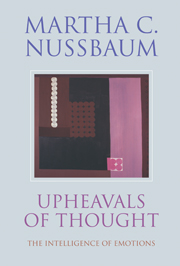Crossref Citations
This Book has been
cited by the following publications. This list is generated based on data provided by Crossref.
NUSSBAUM, MARTHA
1994.
THE TRANSFIGURATION OF EVERYDAY LIFE.
Metaphilosophy,
Vol. 25,
Issue. 4,
p.
238.
Nortvedt, Per
1998.
Sensitive Judgement: an inquiry into the foundations of nursing ethics.
Nursing Ethics,
Vol. 5,
Issue. 5,
p.
385.
Griffiths, Paul
and
Scarantino, Andrea
2001.
The Cambridge Handbook of Situated Cognition.
p.
437.
Deigh, John
2001.
Emotions: The legacy of James and Freud.
The International Journal of Psychoanalysis,
Vol. 82,
Issue. 6,
p.
1247.
Mei-Tal, Maya
2002.
The Criminal Responsibility of Psychopathic Offenders.
Israel Law Review,
Vol. 36,
Issue. 2,
p.
103.
Roy, David J.
2002.
Palliative Care and Euthanasia: A Continuing Need to Think Again.
Journal of Palliative Care,
Vol. 18,
Issue. 1,
p.
3.
Benner, Patricia
2002.
Creating Compassionate Institutions That Foster Agency and Respect.
American Journal of Critical Care,
Vol. 11,
Issue. 2,
p.
164.
Mooney, Gavin
2002.
Public health, political morality and compassion.
Australian and New Zealand Journal of Public Health,
Vol. 26,
Issue. 3,
p.
201.
Mattingly, Cheryl
Lawlor, Mary
and
Jacobs‐Huey, Lanita
2002.
Narrating September 11: Race, Gender, and the Play of Cultural Identities.
American Anthropologist,
Vol. 104,
Issue. 3,
p.
743.
Van Norden, Bryan W.
2002.
The Emotion of shame and the virtue of righteousness in Mencius.
Dao,
Vol. 2,
Issue. 1,
p.
45.
Bracci, Sharon L.
2002.
Bioethics: A “New” Prudence for an Emergent Paradigm?.
Argumentation and Advocacy,
Vol. 38,
Issue. 3,
p.
151.
Berezin, Mabel
2002.
Secure States: Towards a Political Sociology of Emotion.
The Sociological Review,
Vol. 50,
Issue. 2_suppl,
p.
33.
Gibbs, Anna
2002.
Disaffected.
Continuum,
Vol. 16,
Issue. 3,
p.
335.
McInerney, Claire
Davenport, Elisabeth
and
Bekar, Carol
2002.
Knowledge management and organizational climate. Sponsored by SIG KM.
Proceedings of the American Society for Information Science and Technology,
Vol. 39,
Issue. 1,
p.
509.
Brown, Nik
and
Michael, Mike
2002.
From authority to authenticity: The changing governance of biotechnology.
Health, Risk & Society,
Vol. 4,
Issue. 3,
p.
259.
Sanford, Victoria
2003.
Buried Secrets.
p.
211.
Misztal, Barbara A.
2003.
Durkheim on Collective Memory.
Journal of Classical Sociology,
Vol. 3,
Issue. 2,
p.
123.
2003.
Doing the Right Thing: An Approach to Moral Issues in Mental Health Treatment.
p.
1.
Little, J Miles
2003.
Money, morals and the conquest of mortality*.
Medical Journal of Australia,
Vol. 179,
Issue. 8,
p.
432.
2003.
A Brief History of Heaven.
p.
185.



